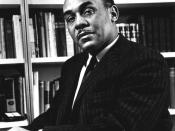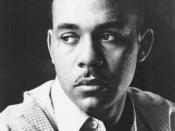Racism in an imperfect culture reveals the intensity that drives the novel Invisible
Man, written by Ralph Ellison. From the harsh words of his fellow peers, the voice of the
'invisible man' comes out. The narrator remains a voice and never emerges as an external
and quantifiable presence. This obscurity emphasizes his status as an "invisible man."
He always tries to be someone he is not or copy the correct identity of a person. Ralph
Ellison exposes the protagonist's arrogance in the beginning of the novel, his sarcasm in
the middle, and his acceptance in the end to create the negative overpowering voice of the
protagonist. It is this lost and battered voice that Ralph Ellison ensnares to use to prove
that continuous negativity creates a dangerous conscience of invisibility.
Before the narrator joins the brotherhood, he is extremely innocent and
inexperienced. His head is held high as he arrogantly starts off on the wrong foot.
He is
respectable to authority and his misunderstandings cause him to suffer. After the "battle
Royal" the protagonist accepts his scholarship from the horrid people who treat him as an
amusement. "'To Whom It May Concern: . . . Keep This Nigger-Boy Running.'(33)" This
is the message that he hears in his dream after the horrible night of humiliation. The
protagonist then still continues to try everything to succeed. His grandfather shows his
invisibility that his grandson has when stating, ""The white folk tell everybody what to
think -- except men like me. I tell them (143) " Here the grandfather is another character
who tries to change to protagonist with his arrogance. Instead of doing any good, he
continues to want to be accepted. Ellison portrays here that copying others can make
nothing but a lost sense of development.
The narrator has...


